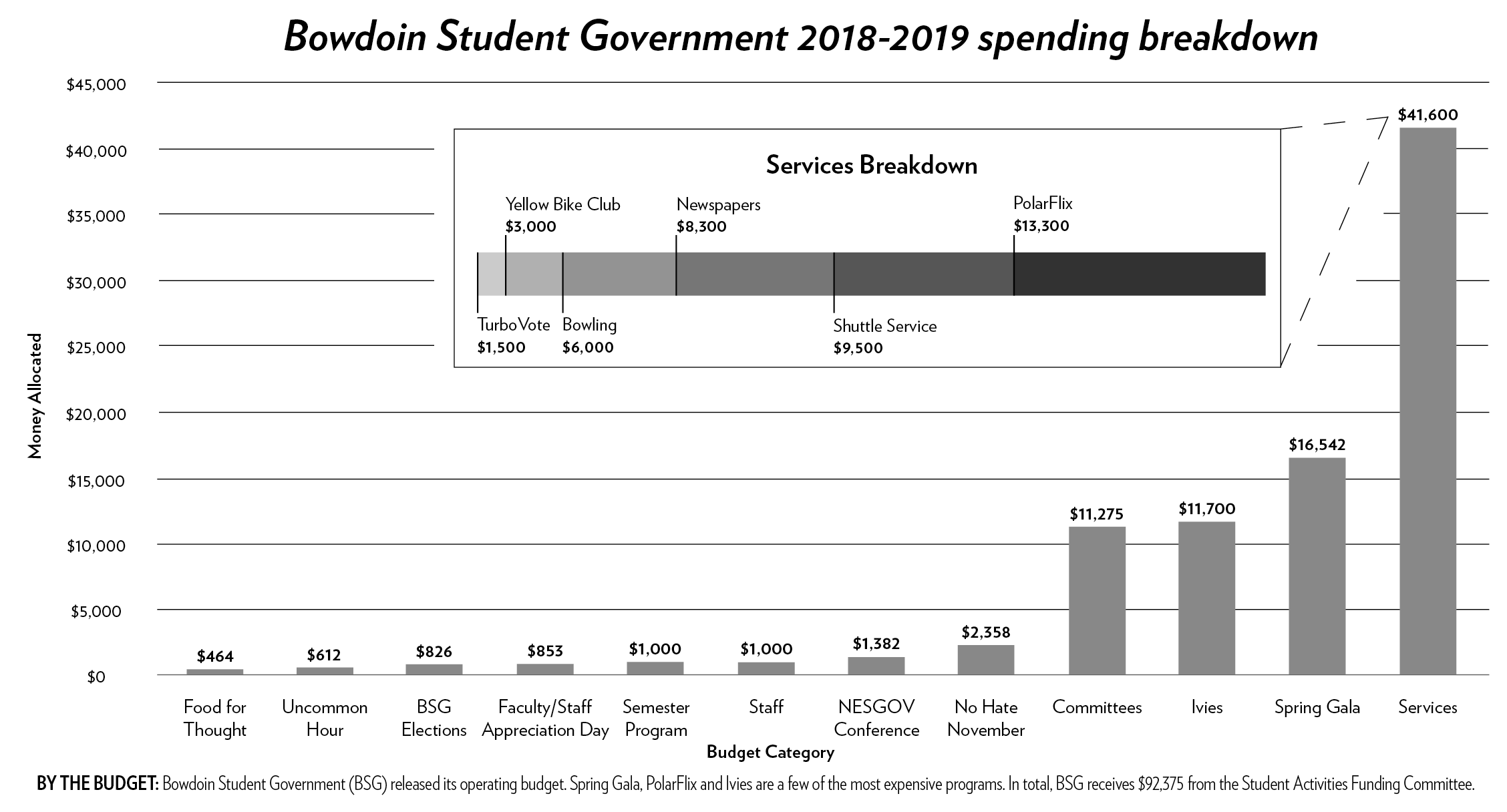BSG releases operating budget to student body
December 7, 2018
In an attempt to increase transparency, Bowdoin Student Government (BSG) has released its operating budget for the first time. Spring Gala, PolarFlix and Ivies come in as the biggest-ticket items, and students can now examine every line of the budget for themselves.
See the full operating budget for yourself here.
The decision to release the budget is part of an ongoing effort to make BSG more accessible. The Student Activities Funding Committee (SAFC) has already released a digest that described how it allocates its $700,000 budget, of which BSG receives 13 percent. With the release of BSG’s operating budget, Bowdoin students can now probe into how exactly BSG spends every cent of its $92,375.
“The BSG pays for and provides a lot of services that people don’t know of. I think people will be surprised at what the BSG offers. That’s definitely a flaw in the BSG. We need to publicize what we do and pay for,” said Harry Sherman ’21, chair of the SAFC.
Sherman’s commitment to increasing transparency echoes the sentiment posted on the SAFC page of BSG’s website: the SAFC works “to promote a vibrant club life on campus that can benefit all members of the Bowdoin student community.”
The feedback of student constituents is integral to the SAFC’s mission. And one of the most basic ways to ensure that student voices are heard is to empower their elected officials.
BSG’s operating budget allocates a sizable amount of money to different committees, such as Facilities and Sustainability and Diversity and Inclusion, to provide the resources required for them to turn student campaign ideas into reality.
“When you run for a position, you lay forth an agenda, and having some pocket change to make certain things happen is really empowering,” Sherman said. “For example, the Chair of Diversity and Inclusion just spent some of their budget on No Hate November. There was a No Hate November budget, but there was some spillover, so he was able to accommodate for that with his budget.”

The committee allocations are $1,000 across the board, with some exceptions: the Executive Team receives a budget of $2,500 and an additional $500 for photo posters, and Student Affairs receives $1,000 for Polar Bear Nation plus $3,000 for the Good Ideas Fund.
“Last year, we made a lot of posters in response to a bias incident. And just having those funds was really important and really helpful,” said Sherman.
Many of the big bucks, however, go toward funding student services. PolarFlix costs $13,300, while $6,000 goes to bowling, $8,300 to newspaper subscriptions and $9,000 to the Shuttle Service.
“Having conversations with some members of Student Activities, I was told there are a small group of people that would be up in arms if all of a sudden their newspapers are gone,” said Sherman. “We have to take those things into consideration … we’re basically trying to keep a bunch of people happy with what services we provide.”
Sherman explained that usage data for services is difficult to track, so the SAFC relies on relative popularity.
The SAFC also funds various events during the year that are independent of specific clubs and committees, among them include events like Food for Thought, Uncommon Hour and the Spring Gala. The Spring Gala is the most expensive event of the year; it costs $16,542 to organize.
Since these events, along with the ones put on by specific clubs and organizations, occur on campus, it is somewhat easier to obtain relevant data. This year, Student Activities is implementing a new survey.
“After events that the SAFC funds, Student Activities has been sending out event evaluations so that club leaders that put on those events answer: were your funds adequate, how did your event go, how many people attended?” Sherman said.
Ultimately, Sherman hopes the release of this information proves to be a step in the right direction for BSG.
“By doing this, I hope to answer the age-old question of ‘what does student government do?’ … I know students care, but I think they’ll start to care a lot more once this data is presented,” he said. “You can’t critique anything if there’s nothing to critique.”
Comments
Before submitting a comment, please review our comment policy. Some key points from the policy:
- No hate speech, profanity, disrespectful or threatening comments.
- No personal attacks on reporters.
- Comments must be under 200 words.
- You are strongly encouraged to use a real name or identifier ("Class of '92").
- Any comments made with an email address that does not belong to you will get removed.

Not for nothing, but this is not the “first time” BSG has released an operating budget. It was standard practice ten years ago. (I realize institutional knowledge is in short supply, but a simple archive.org search would have confirmed this.)
https://web.archive.org/web/20100616084430/http://bsg.bowdoin.edu/bsg/documents3.php